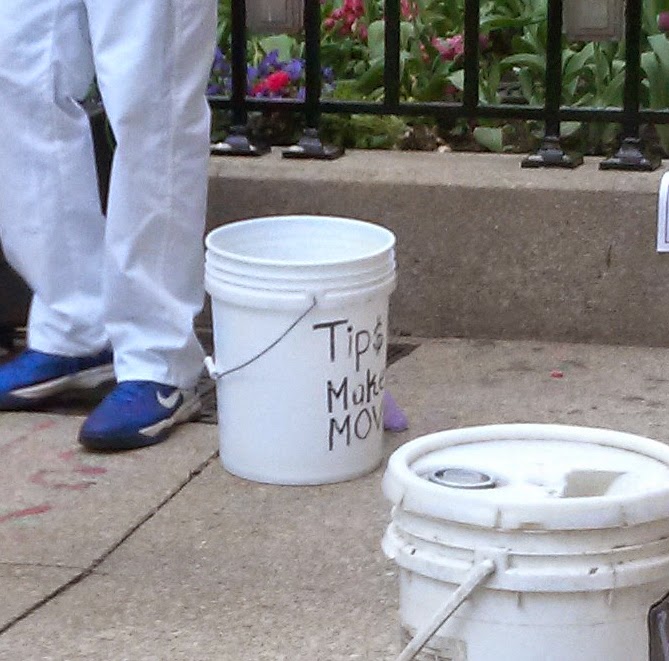(Cuz sometimes it's easier to post on Sundays...)
A woman with a child beside her approached a balloon artist on the street. It was late afternoon at the Festival of Lights, Chicago’s annual Thanksgiving parade, and the sidewalks were quickly filling up with families. After taking a look at the balloon creations that adorned a sign that the man had set up, she asked the performer how much she should “pay” him for a balloon. He responded that there is no price, that he only takes “donations.” The woman suggested, then, that what the artist wants is like “a tip,” only to have the artist repeat that any money given is “a donation.”
He explained, “We don’t need any money. Give what you like.” Yet, despite this claim, a couple minutes later and in response to a man who only handed him a dollar in exchange for a gun-shaped balloon, the balloon artist directly met the man’s gaze: “I more than earned that, my friend. I more than earned what you gave me.” This man later returned to give the balloon artist an additional five dollars.
Here, then, is a “donation” – neither a “tip” nor a “payment” – that the performer does not “need” and yet “earned.” The work of balloon artists would appear to be the most straight-forward out of the different forms of performances buskers do; yet, in something as seemingly direct as a balloon in exchange for money, this particular performer refused to a payment. For this balloon artist, being paid in exchange for an object created and given implies “need.” In this view, he is not performing for money.
The “tip” has an interesting social history as something that once implied inferiority. Today, this same word has been redefined as, at times, as an entitlement (check out Viviana Zelizer's Social Meaning of Money if you're interested). But what about the term "donation"?
"Donation" implies charity and would therefore infer, even more than the “tip,” an unequal status relationship between the giver and the recipient. The balloon artist’s paradoxical statement that the donation is “earned,” and the giver’s subsequent acknowledgement of the performer’s self-proclaimed entitlement by returning with a five dollar bill, complicates this word choice and reveals a social struggle over the very meaning of the term “donation.”
Different street performers choose to label their money in different ways. Some ask for tips. Some insist on donations. And others even avoid labeling their money all together - these buskers are even more abstract in their word choice ("a little something") or extremely specific ("a five, ten, or twenty").
I'm going to end this week's post on that note. I'll talk a little bit more about this next week. In the meantime, if you're a performer, let me know how you label your money and why! I'm curious to learn what you think!
A woman with a child beside her approached a balloon artist on the street. It was late afternoon at the Festival of Lights, Chicago’s annual Thanksgiving parade, and the sidewalks were quickly filling up with families. After taking a look at the balloon creations that adorned a sign that the man had set up, she asked the performer how much she should “pay” him for a balloon. He responded that there is no price, that he only takes “donations.” The woman suggested, then, that what the artist wants is like “a tip,” only to have the artist repeat that any money given is “a donation.”
 |
| Mickey Mouse wants dollar bills!!! |
Here, then, is a “donation” – neither a “tip” nor a “payment” – that the performer does not “need” and yet “earned.” The work of balloon artists would appear to be the most straight-forward out of the different forms of performances buskers do; yet, in something as seemingly direct as a balloon in exchange for money, this particular performer refused to a payment. For this balloon artist, being paid in exchange for an object created and given implies “need.” In this view, he is not performing for money.
The “tip” has an interesting social history as something that once implied inferiority. Today, this same word has been redefined as, at times, as an entitlement (check out Viviana Zelizer's Social Meaning of Money if you're interested). But what about the term "donation"?
.jpg) |
| Tips please! |
Different street performers choose to label their money in different ways. Some ask for tips. Some insist on donations. And others even avoid labeling their money all together - these buskers are even more abstract in their word choice ("a little something") or extremely specific ("a five, ten, or twenty").
 |
| Fat hats! That's what I want... pay me in hats. Or lemons. Though I hear lemon laws mean I get money back if you give me a lemon... |
 |
| I'm gonna call that one 'Tip.' That one is 'Donation.' And ooh! We'll call this one 'Benjamin.'' And this one looks funky. Nice to meet you, Jar Jar Binks. |

No comments:
Post a Comment